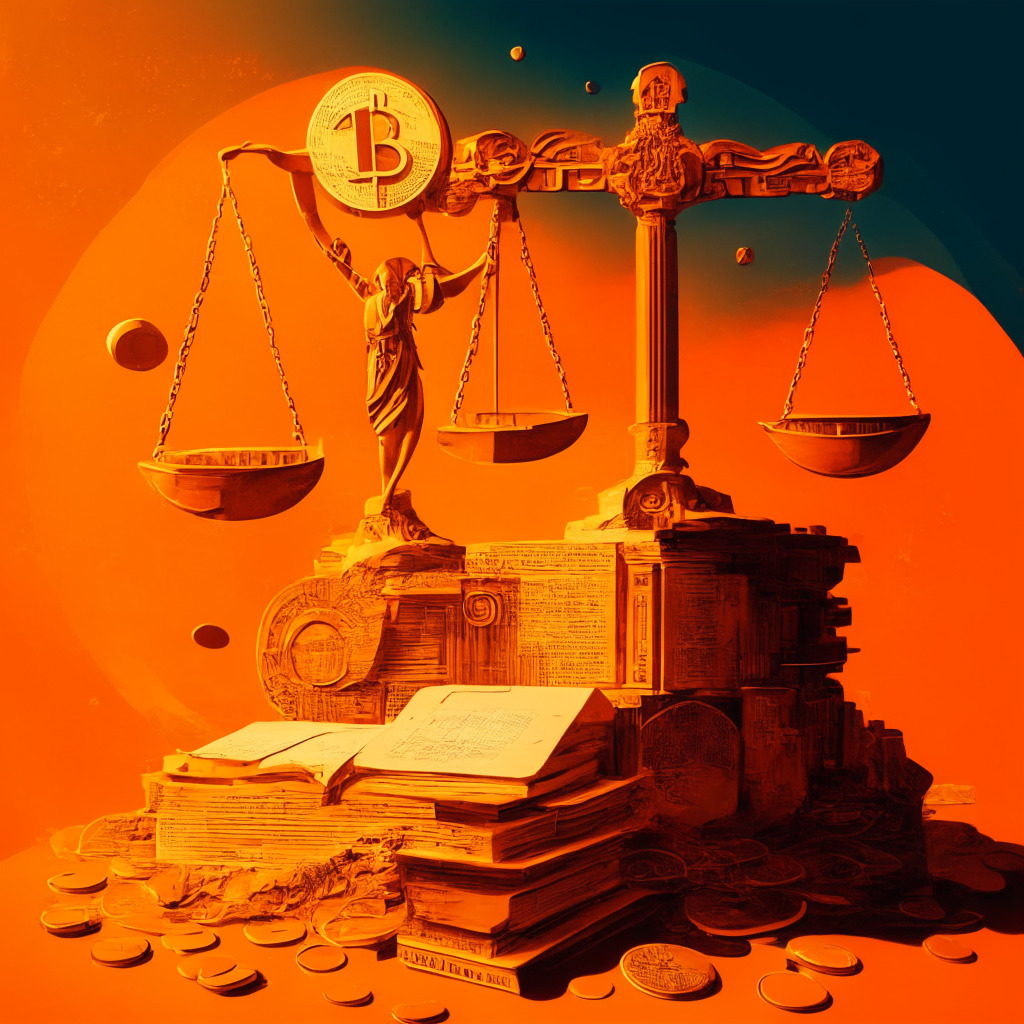Despite regulatory challenges and hacking threats, the crypto sphere continues to innovate, with enhanced privacy, user experience, and transaction efficiency. As Ethereum plans a major transformation and Ripple maintains its legal standing, the tokenized assets market could reach $16 billion by 2030. However, effective regulation remains vital to safeguard all stakeholders.
Search Results for: Buterin
Unveiling the Renaissance of Asia in Cryptocurrency’s Tech Arena: A Paradigm Shift or the Prelude to a Tech Rivalry?
“Ethereum co-founder, Vitalik Buterin, highlights Asia’s increasing mastery over blockchain technology, evident in its active participation in developing ‘account abstraction’ or ERC-4337. This shift towards technical involvement in the blockchain from Asian contingents marks a significant change in the global blockchain landscape.”
Unmasking the Future of Blockchain: Highlights and Controversies from Korea Blockchain Week
“In last week’s Korea Blockchain Week, Web3 and token technology overshadowed traditional blockchain and cryptocurrency dialogue. Many envisioned Web3 as the new internet or evolution of token-based protocols. However, the event spotlighted several challenges, including low public interest and adoption, which the industry must swiftly address to thrive.”
Ethereum Co-founder’s SIM Swap Attack: An Alarm for Crypto Security Measures?
Ethereum co-founder, Vitalik Buterin fell victim to a “SIM swap” attack, losing over $691,000 due to a fraudulent NFT promotion. The incident has shed light on the security flaws associated with phone numbers being linked to social accounts. Decentralized identity control systems could potentially offer a solution to this escalating issue.
Security Chaos in Crypto: Unpacking the $41M Stake Heist and Crypto’s Million Dollar Losses
The article discusses the aftermath of a $41M cryptocurrency heist, with the responsible anonymous hackers gradually transferring stolen funds to different digital wallets. Through multiple related incidents, the piece raises alarms about substantial security concerns within the crypto industry and highlights the potential of AI in identifying threats.
Ethereum Co-founder’s Twitter Breach: An Eye Opener on SIM-swap Attacks, Crypto Security & Lessons Learned
“Ethereum co-founder Vitalik Buterin’s recent Twitter account breach resulted from a SIM-swap attack. This hacking method bypasses two-factor authentication, revealing a glaring weak link in our security: our phone numbers. The event highlights the risks associated with using phone numbers for authentication, urging the need for improved security practices to safeguard crypto investments.”
Exploring the Dark Side of Crypto: The Ethereum Founder’s Hacking Incident and Beyond
“Crypto enthusiasts were left aghast as hackers successfully invaded Vitalik Buterin’s account, netting more than $691,000. Through a malicious phishing link, assailants had full access to unsuspecting users’ wallets. Blockchain analyst ZachXBT revealed that 73% of the stolen fortunes were non-fungible tokens.”
Lido Finance and the ERC-20 Security Flaw: Navigating Uncertain Waters in Crypto Safety
Despite a known security flaw in its token contract, Ethereum staking protocol Lido Finance ensures the safety of Lido DAO (LDO) and staked-Ether (stETH) tokens. The flaw reportedly allows “fake deposit” attacks, deviating from the usual Ethereum standards. The issue arises when a transfer’s value exceeds user holdings, generating a false positive rather than stopping the transaction. While this brings uncertainty, it’s a reminder for thorough testing before integrating new tokens.
Ethereum Co-Founder’s Compromised Account: A Wake-Up Call on Crypto Security
The Ethereum co-founder’s social media account was hacked, with the hacker posting a fraudulent story and a malicious link that resulted in stolen funds totalling $691,000. This incident led to questions about cybersecurity preparedness in the crypto community, highlighting the significant ongoing threat from hacks and scams.
Ethereum Co-Founder’s Hack: Unveiling the High Stakes of Crypto Security
“The Buterin hacking illustrates the immense risk and trust issues in cryptocurrency handling. While decentralization brings transparency and security to systems, it doesn’t entirely remove the threat of cyber attacks. These incidents underscore the importance of robust security mechanisms and fosters awareness about vulnerabilities.”
A Peek at a Full-Throttle Week in Cryptosphere: Developments, Scenarios and Legal Proceedings
“The crypto-sphere saw liquid staking surge to near-record highs and Vitalik Buterin predicting Ethereum full nodes could start running on mobile devices. Blockchain evolution is influencing EU policy, with AR capabilities and blockchain MMORPGs creating a buzz. Meanwhile, illegal activities emphasize the need for regulatory oversight.”
Balancing Act: Ethereum’s Quest for Privacy, Regulation, and Decentralization with Privacy Pools
Ethereum’s co-founder, Vitalik Buterin, leads a privacy protocol initiative, ‘Privacy Pools,’ employing zero-knowledge proofs to verify user funds legitimacy, preserving transactional privacy. The protocol aims to create a separation that filters out funds related to criminal activities, harmoniously balancing financial privacy and regulation.
Balancing Financial Regulation and On-Chain Privacy with Zero-Knowledge Proofs
Ethereum co-founder, Vitalik Buterin, proposes the use of zero-knowledge proofs (ZK-proofs) for ensuring financial compliance and privacy in the blockchain world. This method can verify claim affirmations without divulging all transaction details, thus balancing anonymity and accountability. However, acceptance and successful execution within the blockchain community and regulatory bodies will determine the viability of this potential revolution in blockchain technology.
Shifting Alliances in Crypto Winter: MakerDAO’s Migration and Ethereum’s Controversy
“In the midst of a crypto winter, the blockchain industry is innovating and adapting. Major shifts like MakerDAO’s potential move from Ethereum to Solana or Cosmos depict this change. Discussions suggesting Ethereum should have a “Supreme Court” for disputes also indicate this evolution. Amid technological advances, the volatile crypto world is reminded: “Money doesn’t materialize out of thin air.””
Unraveling Blockchain: Introducing Privacy Pools for Enhanced Security and Compliance
Vitalik Buterin and his co-authors introduced novel “privacy pools” in blockchain, addressing privacy issues and crime associated with privacy mixers. These pools utilize zero-knowledge technology to separate honest transactions from unlawful activities, encouraging transparency and honesty in this digitally decentralized environment. The future of blockchain looks promising yet challenging with regard to privacy and regulatory compliance.
The Ethereum Supreme Court: A Radical Notion to Enhance Blockchain Safety and Stability
Matter Labs CEO, Alex Gluchowski, suggests the creation of an “Ethereum Supreme Court” to mediate disputes that could impact the Ethereum blockchain’s integrity. His proposed system aims to formalize Ethereum’s “social consensus layer” to safeguard platforms against exploitation, enabling community-engaged contract-based mediation in crisis scenarios.
Federal Reserve Impacts on Bullish BTC and Ethereum’s Centralization Struggles
Arthur Hayes, former CEO and co-founder of Bitmex, anticipates a response to the BTC bull market within six to twelve months. This expectation is connected to the Federal Reserve’s $25 billion program meant to stabilize the U.S. banking system. Meanwhile, Ethereum faces challenges around the centralization of nodes and scalability.
Ethereum’s Tug of War: Struggling Between Node Centralization and Ultimate Scalability
Ethereum is battling with the issue of node centralization, with much of its network activity verification reliant on centralized services like AWS. Ethereum’s co-founder, Vitalik Buterin, has indicated that true decentralization, achievable through “statelessness” and operability on affordable hardware, is a key part of Ethereum’s long-term roadmap, despite the technical challenges anticipated.
Ethereum’s Co-founder Sells Remaining Stake in MakerDAO: A Signal for Blockchain’s Future?
Ethereum co-founder, Vitalik Buterin, recently traded his remaining stake in MakerDAO tokens after MakerDAO’s co-founder announced plans to reimplement the project on a new blockchain, NewChain. The move shows shifting alliances and notable developments in blockchain dynamics.
Ethereum’s Scalability Contest: Layer-2 Solutions and the Turning Tide of Gas Fees
Ethereum’s congestion problem might be calming with the help of “layer-2” projects designed for faster, more affordable transactions. Base, a layer-2 project from Coinbase, may demonstrate this effectiveness, as Ethereum’s gas fees have significantly dropped, likely due to layer-2 solutions. Ethereum’s upcoming upgrade, EIP-4844, could further maintain this balance by increasing L2 throughput and reducing transaction costs. However, Ethereum’s future remains uncertain, as the effectiveness of layer-2 projects to resolve scalability issues is yet to be seen.
Ethereum’s Lower Network Activity: A Sign of Successful Scaling Solutions?
Ethereum’s gas fees have hit an 8-month low due to low network activity, yet layer-2 scaling solution popularity is on the rise. This indicates the vital role of scaling solutions in maintaining low fees even amidst growing decentralization. Notably, Ethereum 2.0 and layer-2 solutions seem to alleviate the issue of high adoption against expensive gas fees and slow transaction times. Ethereum’s evolving technology is making it increasingly invincible, even against rival blockchain platforms.
KYC Regulations vs Permissionless Money: The Crypto Crossroads Unveiled by Tornado Cash Crisis
“The recent arrest of Tornado Cash founders has raised questions about the coexistence of KYC regulations and permissionless money. With platforms like Bitcoin’s Lightning Network and MetaMask allowing near-traceless transactions, the intrusion of KYC challenges the decentralization and anonymity that cryptocurrencies offer. This situation brings the future of crypto at a crossroads between regulatory vigilance and sector’s initial ethos.”
BlackRock’s Alleged Bitcoin Wallet: Benefactor or Malefactor in the Cryptocurrency Labyrinth?
Speculation about the world’s third largest Bitcoin wallet residing under financial giant BlackRock stirs uncertainty in the crypto community. Crypto advocate Lark Davis expresses skepticism over BlackRock’s alliance with Bitcoin, cautioning that their powerful influence may extend into the crypto space. Despite ambiguity surrounding BlackRock’s intentions, their dominant position and high ETF application success rate suggest they could significantly impact the crypto landscape.
Decoding Ethereum Layer-2 Networks: Coinbase’s Pivot, Shibarium’s Revamp, and Solana’s Resurgence
The blockchain realm witnesses escalating discussions about secondary “layer-2” networks built atop Ethereum using “zero-knowledge” cryptography. Meanwhile, Coinbase pioneers blockchain education by operating its own blockchain, Shibarium aims to resolve network issues, and Solana recovers after significant setbacks while Terra falls victim to hackers.
OP Stack Vs. ZK Rollups: Navigating the Future of Layer-2 Blockchain Technology
Major crypto enterprises like Coinbase, Binance, and a16z are setting up their own “layer-2” blockchain networks using OP Stack, despite the belief that promising layer-2 solutions will come from “ZK rollups” and not optimistic rollup technology. However, the choice of OP Stack may be due to its ease of setup. ZK rollups, while promising, require advanced hardware and high energy consumption.
Surviving Crypto Storms: Lessons from eToro’s Resilience and Bitcoin’s Bumpy Journey
“Birthed in 2009 during banking crisis, Bitcoin introduced a revolutionary digital value transfer mechanism. Yoni Assia, CEO of eToro, capitalized on this, driving towards tokenizing assets on blockchain. Despite setbacks, Assia’s resilience, adaptability, and innovation support blockchain’s rise in financial world.”
Ethereum Co-Founder’s Million-Dollar Move Amid Market Downturn: An Indicator or a Red Herring?
The cryptocurrency market, including key players Bitcoin and Ethereum, is experiencing losses amidst market unpredictability. Ethereum co-founder, Vitalik Buterin, notably transferred $1 million worth of Ethereum to Coinbase. This move, along with the general market downturn, is sparking speculation among the crypto community.
Imperial College London and FluidAI Tackle Crypto Liquidity Challenges: A Leap Forward or a Risky Venture?
Imperial College London’s AI lab is collaborating with AI startup FluidAI to address liquidity aggregation, a key issue in the crypto space. Despite scepticism, FluidAI CEO, Ahmed Ismail, believes AI could potentially enhance the “tokenised market” by overcoming latency in bid/ask prices, improving liquidity. However, over-reliance on AI prediction models could risk market distortions.
Crypto Markets Calm as Storm Brews Behind the Scenes: Failures, Diversification, and Anticipated Swings
Major cryptocurrencies showed a stable trend, despite turbulence like the slump of SHIB partially due to its unsuccessful Ethereum layer 2 network, Shibarium. Ethereum co-founder, Vitalik Buterin, transferred $1 million worth of cryptocurrency whilst facing a market downturn. This turbulent environment led to a strategic shift for bitcoin miners into new business areas.
Ethereum Co-founder’s $1M ETH Deposit: Leverage Move or Doubts in Decentralization?
“Ethereum co-founder, Vitalik Buterin, deposited around $1 million worth of Ether into Coinbase amidst Ether’s 10% market slump. Further intriguing is his withdrawal of $1.6 million worth of Ether, which raises questions about his confidence in the decentralized system versus traditional exchange avenues. “
Merging Finance and Blockchain: eToro’s Radical Shift versus Elon Musk’s Risky Maneuvers
“Yoni Assia, eToro’s co-founder, embraced financial technologies to democratize trading. eToro, under his steer, simplified brokerage account set up, enabling users to start trading swiftly. Influenced by programmer Vitalik Buterin, eToro introduced Bitcoin trading, aiding in a blockchain industry transformation.”
Navigating the Crypto Landscape: Unraveling the Promise & Peril of New Blockchain Protocols
“As exciting as the blockchain future is, potential hitches and bumps exist. To thrive, one needs to adapt continuously and reassess strategies, while remaining open to shifts and turns. Investing in these technologies requires a pragmatic yet resilient approach, particularly in the early and volatile days.”































